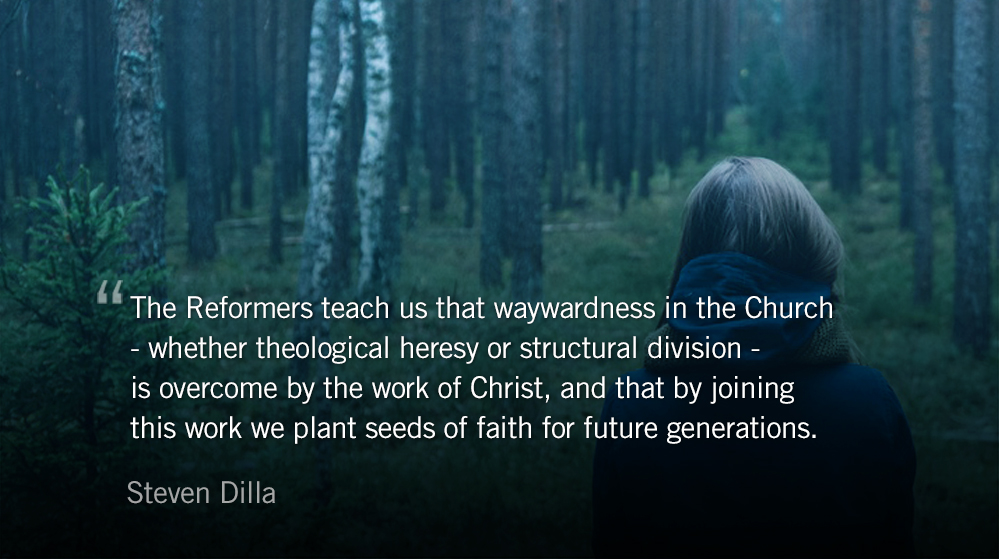While we want to fasten on the Word, we also want to show how we’re part of a chain in history that goes back, and back, and back. We’re not trying to be so innovative that we’re the first generation to get it all right. — D.A. Carson
Reading the language of Luther, John Calvin, and the other Reformers can be disheartening today. In addition to calling the Pope the “antichrist,” Calvin also hurled names like “pigs,” “riffraff,” and “asses” at his opponents.
“When you read Luther and Calvin, a lot of their polemical statements, a lot of the ways in which they talk about the Papacy, and so-on, you look at them and say, ‘you shouldn’t talk that way,’” concludes Timothy Keller. “But that was a different situation… It was life-and-death.”
We must remember that the sum of what Christians should believe is not identical to the essentials we must believe for salvation. We need to leave room for believers to grow in their understanding of the faith. We believe in justification by faith in Christ, not justification by accuracy of doctrine. We are saved by grace, not by intellectual precision. — Justin Holcomb
This doesn’t mean the abandonment of disciplined and thoughtful faith, however. Holcomb reminds, “In order to love God aright, and to be assured of the salvation he offers, we must know who God is and what he has done for us in and through Jesus Christ.”
The reason we believe the Reformation is so important is because we think they did get the Bible right. You had a massive movement in which people sought to look at Scripture and find out what the biblical gospel truly was. — Timothy Keller
We know that the visible unity of the Church is the work and gift of the Holy Spirit, who will bring it about in His time… The division among Christians is the fruit of our sin, and it is a scandal and our greatest impediment for the mission for which the Lord has called us: announcing the Good News of the Gospel.
Today, the blood of the many Christians slaughtered in diverse parts of the world cries out to heaven. The one that persecutes does not make a mistake, he doesn’t ask if they are Catholic, Evangelical, Orthodox… they are Christians, followers of Jesus Christ, and that is enough. This blood challenges us: Do we have the right to make our divisions a priority while the blood of our brothers is shed for the testimony of Jesus Christ?
This is the moment of reconciliation, to accept “the unity in reconciled diversity,” an expression of Oscar Cullman. We know very well what divides us, let us be more strengthened in what unites us: the common faith in Jesus Christ as the only Lord and Savior, the Word of God, and Baptism. — Pope Francis
Luther’s intention wasn’t division, but renewal. The heart of the Reformation is the recovery of the gospel, inside the Church, for the good of the world. The Reformers teach us that waywardness in the Church — whether theological heresy or structural division — is overcome by the work of Christ, and that by joining this work we plant seeds of faith for future generations.
2 Kings 11-12 (Listen – 7:38 )
2 Timothy 2 (Listen – 3:17)
2 Kings 13 (Listen – 4:33) 2 Timothy 3 (Listen – 2:21)
2 Kings 14 (Listen – 5:06) 2 Timothy 4 (Listen – 2:48)
The Weekend Reading List
- Luther’s Ninety-five Theses: What You May Not Know and Why They Matter Today. Justin Holcomb for The Gospel Coalition.
- Keller, Piper, and Carson on Why the Reformation Matters Today. Video on The Gospel Coalition (8:54).
- Why You Shouldn’t Call That False Teaching a Heresy. Justin S. Holcomb for Christianity Today.
- Pope Pious: What Evangelicals Like About Francis. Chris Castaldo for Christianity Today.
- What Was Luther Doing When He Nailed His 95 Theses to the Wittenberg Door? Justin Taylor for The Gospel Coalition.


